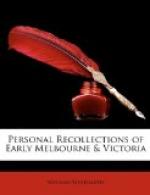From these lively and mixed events of our early society, let me now turn to another subject, which is neither less lively nor less mixed than its predecessors—the subject, namely, of:
JOHN PASCOE FAWKNER, FATHER OF MELBOURNE.
“The force of his own merit makes his way.” —Henry VIII.
“Well, I am, not fair; and therefore I pray the gods to make me honest.” —As You Like It.
“He’s honest, on mine honour.”
—Henry VIII.
“He hath a heart as sound as a bell, and his tongue is the clapper; for what his heart thinks, his tongue speaks.” —Much Ado About Nothing.
“For now he lives in fame, though not in life.” —Richard III.
If circumstances won’t make a poet, as genius contemptuously asserts, nor make up for blood in a horse, as even the stable boy swears to, they are at times marvellously effective in making, and, for the matter of that, also in unmaking men. So might we say with regard to the well-known subject of this sketch, who, arriving amongst us with the earliest, and within the repellent surrounding of an evil repute, yet under different surroundings and favouring circumstances outlived all traducements, whether true or otherwise, and after a long, practical, and singularly useful career, died in the full regard of his adopted country. The unanimity of dislike and moral depreciation with which he was regarded by his Tasmanian fellows was not indeed without a certain share of reason or excuse. That he was the son of a convict ought not, of course, to prejudice him in these Christian days, when the sins of the fathers are not to be visited upon the sons even to the first generation. His father arrived with Collins’s prisoner party, and the boy, John Pascoe, then eleven years old, was sent with his parent—for not seldom were wives or children thus sent with the convicts, to ameliorate by such a touch of nature the hard features of a society of adult vice, much as Hogarth, in some of his masterpieces of the human woes or vices of his time, gives, in striking contrast, a foreground of maternal affection, or of children at play in the artless innocence of their looks and ways.
But he was probably neither a pretty nor an interesting boy; for as a man he was of the very plainest, with a short figure, always negligently “put on,” a rough, mannerless way, and a voice husky and hoarse, although redeemed at times into an approach to commanding an audience, when he was strongly stirred in some exciting cause. Some people have no patience to subdue natural antipathies in such cases, and these people would, as well-known scripture (with some transposition of the idea) tells us, be apt to be most plentiful “in his own country.” But, again, Fawkner was himself a convict. Yes, but for what? Certainly if a man so notorious in after life had committed any very disparaging crime it must have been as notorious as his name. But I never heard




